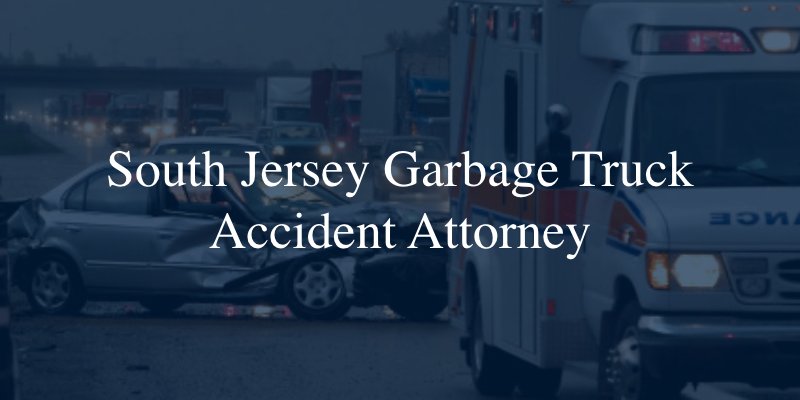South Jersey Garbage Truck Accident Lawyer
Request a Free ConsultationWe think of garbage trucks as large, benign vehicles lumbering through our neighborhoods and communities. Because they typically move slowly, most drivers don’t consider them an accident risk; however, the most recently released data by the Federal Motor Carrier Safety Administration (FMCSA) shows over 1400 injuries and 107 fatalities from garbage and refuse truck accidents in a single year. About 25% of these injuries occurred to sanitation workers while 75% were to motorists in other vehicles as well as pedestrians, and bicyclists.
Recovering compensation after a garbage truck accident has unique challenges due to different rules and timelines associated with claims against city and county government agencies. Speak to an accident attorney in South Jersey for more information.
Why Do Garbage Truck Accidents Occur in South Jersey?

Many drivers don’t realize that garbage trucks are among the heaviest vehicles on the roadways, weighing as much as 51,000 pounds when fully loaded. In an accident with an average 4,000-pound standard car or unprotected pedestrian, the injuries are often serious, catastrophic, or fatal. Common causes of garbage truck accidents include the following:
- Garbage trucks have poor visibility, with drivers relying on information from the worker on the back of the truck about when the way is clear and when to proceed or reverse
- Garbage trucks are typically out before dawn with inadequate lighting and often foggy conditions
- Garbage truck drivers must make frequent stops, starts, reverses, and turnarounds
- Sanitation workers sometimes stop in mid-street to save time
- Garbage trucks may have defective parts or receive inadequate maintenance
- Drivers may be distracted, intoxicated, inadequately trained, or inexperienced
Sometimes drivers become impatient with a garbage truck’s slow progress and frequent stops, causing them to make an unsafe passing attempt.
What Types of Injuries Occur in Garbage Truck Accidents in South Jersey?
Because of the large size and heavy weight of garbage trucks, accident victims often suffer severe injuries or fatalities. Common injuries cited in garbage truck accident claims include the following:
- Neck injuries
- Back injuries
- Traumatic brain injuries
- Fractures
- Internal organ damage
- Spinal cord injuries
- Facial trauma
- Soft-tissue injuries to shoulders, wrists, and knees
- Lacerations, contusions, and abrasions
In some cases, garbage truck accidents result in wrongful death. A successful wrongful death claim after a garbage truck accident could recover compensation for close family members. Call a South Jersey wrongful death attorney today!
What Makes A Claim for Damages After a Garbage Truck Accident in South Jersey Challenging?
Most sanitation services are part of the local city or county government, meaning there may be additional rules and timelines to file a compensation claim. For example, New Jersey law requires a notice of an impending claim filed within 90 days of the date of the accident or injury in any claim against state, county, or municipal entities and their affiliated institutions. Damage to personal property has a six-year statute of limitations for claims but there is a two-year statute of limitations for personal injury claims in New Jersey, including for garbage truck accidents.
Additionally, your right to file a lawsuit could depend on whether you chose a limited right to sue or unlimited lawsuit rights on your auto insurance policy under New Jersey’s no-fault insurance laws.
How Can a Garbage Truck Accident Lawyer in South Jersey Help My Case?
No one should have to handle a complex legal claim against a government agency without experienced representation, especially while they are trying to recover from injuries or the loss of a loved one. Call the truck accident attorneys in South Jersey at Grungo Law to set up a free consultation so we can strategize the best way forward for your claim so you recover the maximum compensation available to you.
